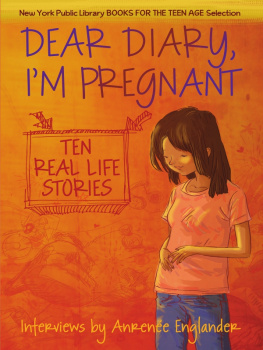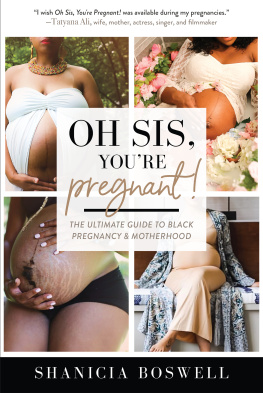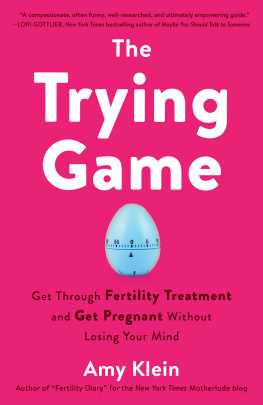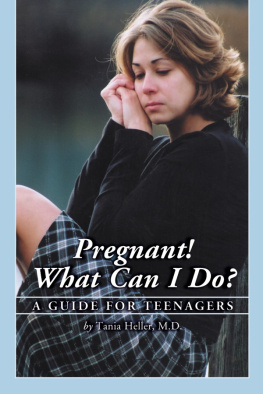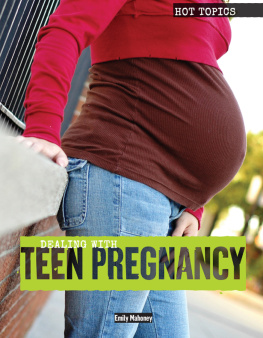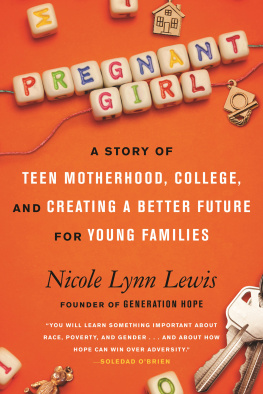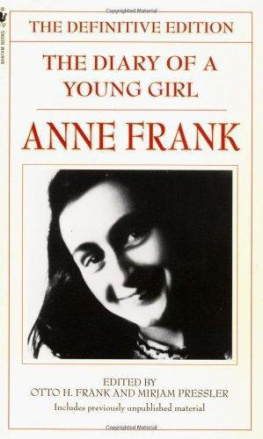
To those I owe so much
Warren, for knowing who I am, and loving me anyway
Mom, for teaching me about choice and for being so proud of me
and Karen, for always showing me whats right
A.E.
Except for memory, time would have no meaning at all.
Pat Conroy, Beach Music
Contents
I would like to express my deepest thanks to Warren Hales, Leah Erna Beck, Karen Englander, Bill McLaughlin, and Tania Englander, who all tirelessly imparted their invaluable advice and offered their unwavering support every time I needed it, and even when I didnt. I love you.
For their very great cooperation and assistance in encouraging teenagers to participate in the interviews, Helen Jones and her colleagues at the Morgentaler Clinic; Carolyn Kroeber, York Region Board of Education; Eileen Alexiou, Jessies Centre; and Ruth Ewert, Evergreen Health Centre, thank you. My sincere appreciation to all the women and men in Canada and the United States who graciously took the time to return my phone calls and paste up our flyers.
A special thank-you to Beth-Ann Little, who selflessly accepted that I pursue this endeavor alone.
I am especially indebted to all the young women who took the time to be interviewed. I am honored to be the one to whom you chose to divulge your secrets, and touched that you were able to share your tears, your laughter, and your truths with me. Whether or not your story lies within these pages, you have all helped somebody with their decision, as your story awarded me the guidance to ultimately make the best book that I could. Thank you.
t his book is about difficult choices. A young woman confronted with the discovery that shes pregnant might feel overwhelmed, scared, even suicidal. Dear Diary, Im Pregnant allows teenagers the opportunity to meet other teenagers who have had to confront this situation and to see how they handled that experience.
I developed the premise for this book in 1991, when a young woman I knew found herself facing an unplanned pregnancy. Wishing to help her, I looked for a book that offered information on her choices and what she might expect from each one. That book did not exist. In the next few years, two more young women I knew experienced that same situation. Feeling as helpless as I had in the past, I decided to try to develop the book myself. For two years, I distributed flyers all across North America asking teenage girls who had been pregnant to come forward and be interviewed. The flyers were posted in health clinics, hospitals, high schools, shelters, and anywhere else I might reach pregnant teens. Knowing my readerswould come from all walks of life, my aim was to interviewteenagers from many cultures, races, and socio-economic backgrounds.Ultimately, I spoke with nearly 40 young women. The interviews were held in their homes or other places where they felt comfortable, and they usually lasted three hours.
During the interviews, the teens would discuss extremely painful issues, which often brought them to tears. At those times a part of me felt that I was exploiting them. I knew, though, that the interviews should continue, because by talking about their experiences, these teens would help others to make decisions about their own pregnancies.
It should be acknowledged that one scenario was not encountered in any of the interviews: a young woman deciding to keep her child and subsequently finding that this decision has led to extreme hardship or unhappiness. While the teens in this book discuss some of the burdens of being a mother, they always go on to describe the pleasures. Some teens may never feel the rewards of motherhood; however, none of these women came forward to be interviewed for this book. It is very difficult for a teenage mother to admit to herself and to society that she made the wrong choice in keeping her baby, but that reality does exist and must be recognized.
I have to believe that the stories were told to me in good faith. (The reader must also take into consideration that I heard only one side of each multifaceted story.) At times, however, the possibility was triggered in my mind that I was not being told the whole truth. Nevertheless, as I was not investigating but purely reporting, I have to trust that these women were being honest with me and with themselves, and that they were motivated only by their hope of helping another teen.
This book is not meant to be a platform for advocating one choice over another. On the contrary, wethe interviewer, the editor, and the publishercame to this project hoping to broaden the spectrum of ideas for our readers. Although not all the stories have a happy ending or even a clear resolution, each one was carefully selected so that there would be an overall balance among adoption, abortion, and motherhood. We also worked to ensure that the interviews reflected a variety of responses, so as not to perpetuate or form any stereotypes in the readers mind.
At the same time, we are aware of the fact that none of the young women interviewed would be classified as a perfect daughter coming from an ideal family (in which the parents are happily married, financially stable, and neither physically nor sexually abuse their children). But we know that teen pregnancy can and does happen through every strata of our society; nobody is exempt. Thus, it is very important for the reader to know that while model teenagers (for example, those who do not use drugs, are A students, and have not left home) are seen by counselors and agencies all the time, none responded to our requests to be interviewed.
In compiling Dear Diary, Im Pregnant, I wanted to create a safe place for pregnant teenagers to learn of the hopes and dreams, and even the darkest secrets, of other teens who have faced an unplanned pregnancy. Since its initial publication in 1997, I have heard from many readersboth teens and adultsabout how valuable the book has been. It initiated conversations that might not otherwise have taken place and opened up serious consideration of choices that are so terribly difficult to make.
In the past 13 years, as the teens profiled in this book have grown into adults, another generation of girls has entered their teens. But in the twenty-first century, little has changed for those who find themselves with an unplanned pregnancy. The options available remain the sameadoption, abortion, or motherhoodand the emotional toll and practical consequences of each choice are still just as difficult. Similarly, the need for providing information, guidance, and support for teenage girls facing what is likely the biggest decision they have ever made is just as relevant and crucial today. As this revised edition reaches a new generation, I hope that it continues to help make the choices of a pregnant teen clearer, easier, and much less frightening.
A final note: we have changed and/or concealed all names, places and clearly identifiable details in order to protect the privacy of the interviewees and their families.
Anrene Englander
Toronto, Canada
2010
Annick Press Ltd. does not advocate or endorse any course of action discussed in this publication. Furthermore, we caution the reader that it is impossible to reflect, in 10 stories, the full range of experiences and situations faced by pregnant teens: teenagers from all segments of society can and do become pregnant, and each persons circumstances are unique.
We hope that this book will be a source of both emotional and psychological support for young people.
Annick Press Ltd.
Eve and I went to three different restaurants before we found somewhere that she felt was just right to tell her story of being pregnant at 15 and deciding to place her child for adoption.
Next page
